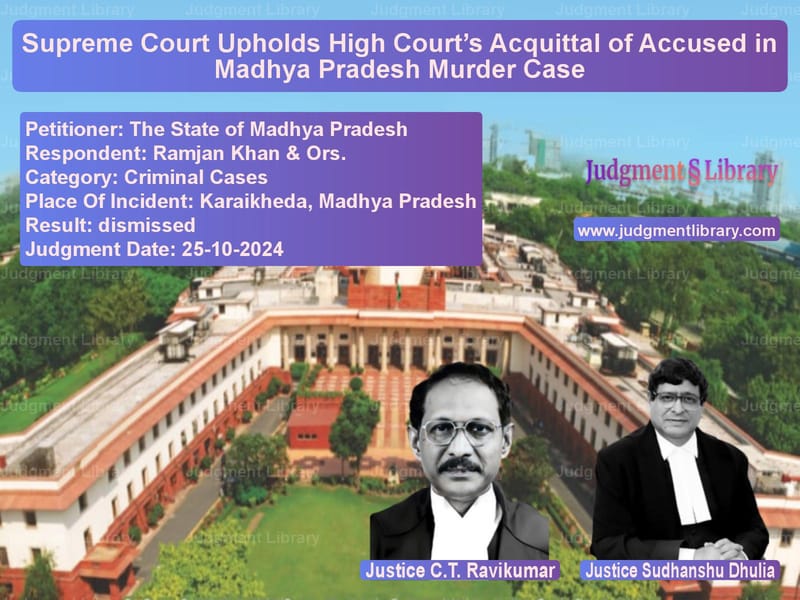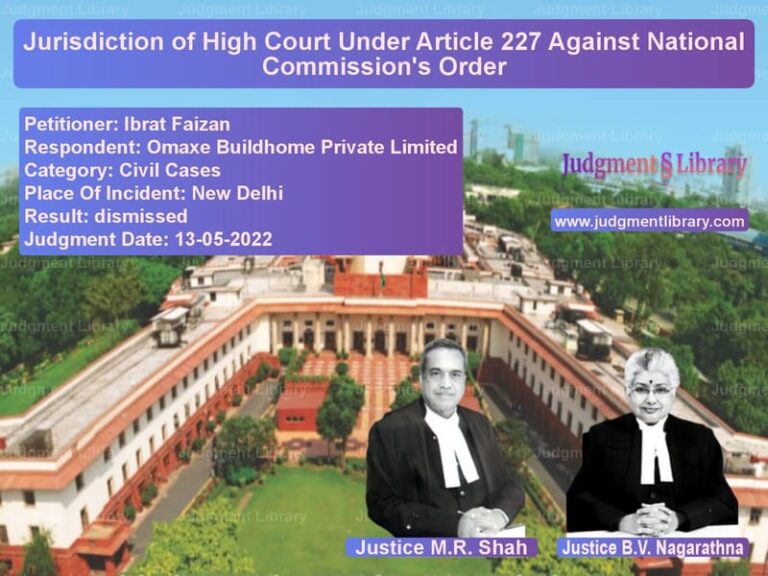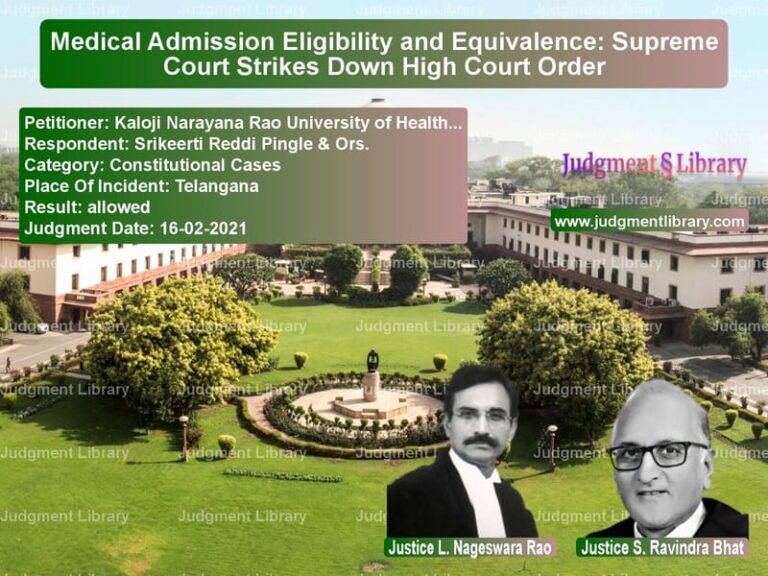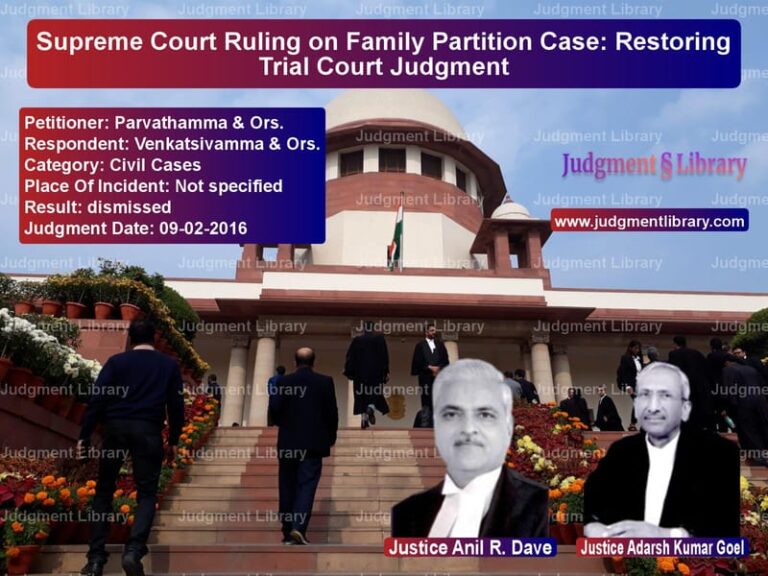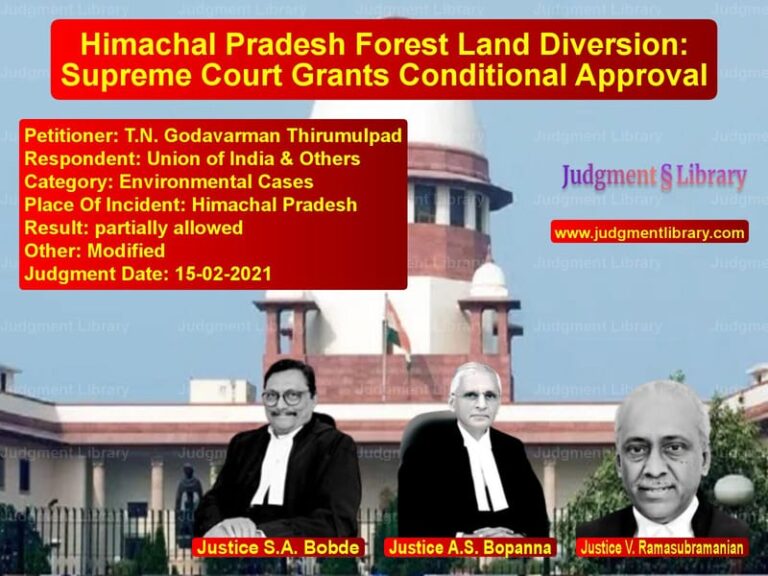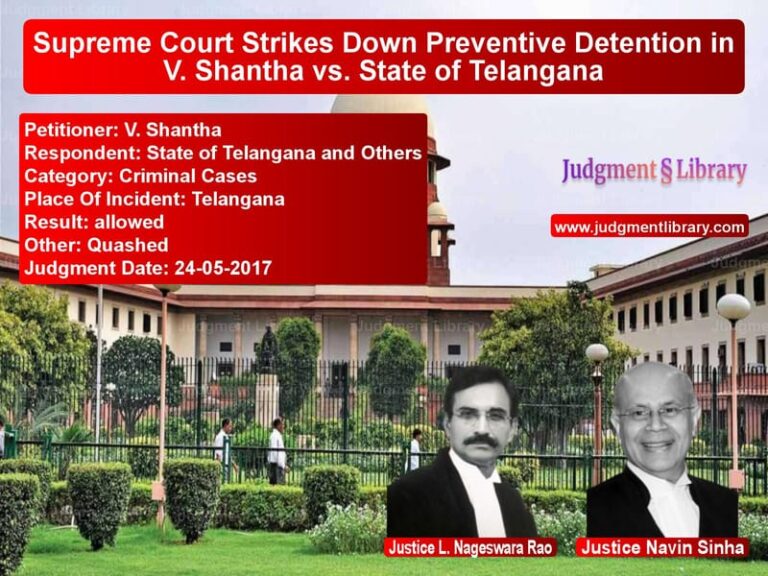Supreme Court Upholds High Court’s Acquittal of Accused in Madhya Pradesh Murder Case
The case of The State of Madhya Pradesh v. Ramjan Khan & Ors. presents an intense legal battle revolving around a murder incident that took place on October 1, 1996. The prosecution alleged that the accused, Ramjan Khan, Musaf Khan, and Habib Khan, murdered Naseem Khan near the village well of Karaikheda by attacking him with a sickle, axe, and stick. The trial court convicted the accused under Section 302 read with Section 34 of the Indian Penal Code (IPC) and sentenced them to life imprisonment. However, the High Court of Madhya Pradesh overturned the conviction, acquitting the accused based on evidentiary inconsistencies. The State of Madhya Pradesh subsequently challenged the acquittal before the Supreme Court.
The Supreme Court, after thoroughly examining the evidence and legal principles, upheld the High Court’s verdict, reaffirming the principle that an acquittal can only be overturned if there is a clear miscarriage of justice.
Background of the Case
The case originated from an incident on October 1, 1996, at approximately 1:00 PM near the village well of Karaikheda. The prosecution claimed that the accused—Ramjan Khan, Musaf Khan, and Habib Khan—assaulted Naseem Khan with lethal weapons, leading to his death. The prosecution charged them under Section 302 (murder) read with Section 34 (common intention) of the IPC. The trial took place before the Additional Sessions Judge, Sironj, where the prosecution examined 19 witnesses to establish its case.
The prosecution heavily relied on the testimonies of two key witnesses, Haseen Khan (PW-5) and Farid Khan (PW-9), both minor brothers of the deceased, who claimed to be eyewitnesses. Their mother, Sitara Bi (PW-8), was also a crucial witness and the informant in the case. The forensic evidence, including the postmortem report prepared by Dr. S.S. Thakur (PW-1), confirmed that the injuries inflicted on Naseem Khan were sufficient to cause death.
Trial Court’s Conviction
The trial court relied on the testimonies of PW-5 and PW-9, corroborated by PW-8, to convict the accused. It accepted the prosecution’s argument that the oral testimonies of the deceased’s brothers and mother were credible and that the medical evidence confirmed their claims. The court held the accused guilty of murder under Section 302 IPC and sentenced them to life imprisonment along with a fine of ₹35,000.
High Court’s Reversal and Acquittal
However, the High Court of Madhya Pradesh, in Criminal Appeal No. 602 of 1998, reversed the conviction, holding that the prosecution had failed to prove the guilt of the accused beyond a reasonable doubt. The High Court found several inconsistencies in the witness statements, particularly in the testimonies of PW-5, PW-9, and PW-8. It noted that the mother (PW-8) had not initially mentioned any oral dying declaration by the deceased in her police statement, raising doubts about the reliability of her testimony. Additionally, the two alleged eyewitnesses (PW-5 and PW-9) omitted crucial details in their initial police statements, which they later introduced during their court depositions.
The High Court ruled that these contradictions created reasonable doubt about the prosecution’s case and granted the benefit of doubt to the accused, leading to their acquittal.
Arguments Presented Before the Supreme Court
Petitioner (State of Madhya Pradesh)
The State of Madhya Pradesh challenged the High Court’s acquittal, arguing that:
- The trial court correctly relied on the testimony of PW-5 and PW-9, who were present at the crime scene.
- The High Court erred in dismissing PW-8’s testimony regarding the oral dying declaration.
- The medical evidence confirmed that the deceased suffered fatal injuries inflicted by sharp and blunt weapons, matching the weapons allegedly used by the accused.
- The discrepancies in the witness statements were minor and did not discredit the entire prosecution case.
Respondents (Accused)
The defense countered by highlighting critical issues in the prosecution’s case:
- PW-5 and PW-9 failed to mention the accused in their initial police statements, making their later testimonies unreliable.
- PW-8’s statement about an oral dying declaration was an afterthought, as it was absent in her initial complaint and only surfaced in court.
- Two key witnesses, PW-2 and PW-17, turned hostile, further weakening the prosecution’s case.
- The High Court had correctly applied the principle that benefit of doubt should be given to the accused when inconsistencies arise in prosecution evidence.
Supreme Court’s Verdict
The Supreme Court, citing precedents such as Jai Karan & Ors. v. State of U.P. and Govindaraju v. State by Sivaramapuram PS, reiterated that an acquittal should not be overturned unless there is a grave miscarriage of justice. The Court examined the prosecution’s evidence and found that:
- The prosecution failed to prove guilt beyond a reasonable doubt.
- Eyewitness testimonies were inconsistent and lacked credibility.
- The alleged oral dying declaration was unreliable as it was not mentioned in the initial police statements.
Based on these findings, the Supreme Court dismissed the appeal and upheld the High Court’s acquittal of the accused.
Key Legal Takeaways
- Acquittals should not be overturned unless there is a clear case of legal or factual perversity.
- Minor contradictions in witness statements are not always detrimental, but major inconsistencies that affect credibility can weaken a prosecution case.
- The principle of benefit of doubt remains a cornerstone of criminal jurisprudence.
Ultimately, the Supreme Court reaffirmed the principle that in cases where reasonable doubt exists, the accused must be given the benefit of the doubt.
Petitioner Name: The State of Madhya Pradesh.Respondent Name: Ramjan Khan & Ors..Judgment By: Justice C.T. Ravikumar, Justice Sudhanshu Dhulia.Place Of Incident: Karaikheda, Madhya Pradesh.Judgment Date: 25-10-2024.
Don’t miss out on the full details! Download the complete judgment in PDF format below and gain valuable insights instantly!
Download Judgment: the-state-of-madhya-vs-ramjan-khan-&-ors.-supreme-court-of-india-judgment-dated-25-10-2024.pdf
Directly Download Judgment: Directly download this Judgment
See all petitions in Murder Cases
See all petitions in Bail and Anticipatory Bail
See all petitions in Fraud and Forgery
See all petitions in Attempt to Murder Cases
See all petitions in Custodial Deaths and Police Misconduct
See all petitions in Judgment by C.T. Ravikumar
See all petitions in Judgment by Sudhanshu Dhulia
See all petitions in dismissed
See all petitions in supreme court of India judgments October 2024
See all petitions in 2024 judgments
See all posts in Criminal Cases Category
See all allowed petitions in Criminal Cases Category
See all Dismissed petitions in Criminal Cases Category
See all partially allowed petitions in Criminal Cases Category

